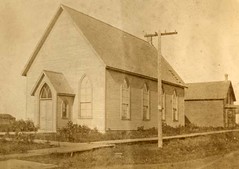
Presbyterian Church, Pembina, N.D.
(Circa 1900-1909) - Photo Courtesy:
State Historical Society of North Dakota
_______________
Few names are better known to the pioneer residents of the Red River valley than that of the Rev. John Scott, who was for years engaged in ministering to the spiritual wants of the early residents of the northern part of the present state of North Dakota. Mr. Scott was born in Northumberland, England, December 22, 1824. He came with his parents to Canada, the family locating in the county of Durham. After attending school there he engaged in teaching and provided himself with means to enter college. He graduated from Hamilton College, and then offered himself to the Presbyterian Board of Missions for missionary service. He was appointed to take charge of the field at Bath, Canada. He was married just before commencing his work, and through more than a half century of missionary effort his wife labored with him in missionary work. He remained at Bath for six years and was then sent to Napance, where he was stationed eighteen years. Emerson1, Manitoba, was his next appointment, and he was in charge there for ten years, preaching also part of the time at Pembina. He became a resident of North Dakota in 1884, preaching at Walhalla, and also occasionally at the military post at Pembina. From 1892 to 1894 he was pastor at Pembina, when he was compelled by failing health to relinquish his pastorate...
In 1876 and for several years thereafter Mr. Scott was chaplain of the military post at Pembina. He also frequently preached in the village, before there was any church there except the Catholic mission. William Moorhead was at that time the proprietor of a saloon known as the "Robber's Roost." Mr. Moorhead threw open his saloon for his services, and Mr. Scott has remarked that he never had more attentive or courteous audiences to hear his preaching than gathered at Robbers' Roost. Mr. Scott frequently made preaching trips as far west as the Turtle mountains, making the journey of two or three weeks, usually with pony and buckboard. His stopping places en route usually included John Otten's, at Smugglers' Point, about twenty miles west of Pembina; William Hyde's, at Hyde Park; O. Neilson 's, at Bay Center; and at St. Joe2 he was entertained by J. P. Mager, H. A. Mayo, Mrs. Emmerling and others. Later, while stationed at Walhalla, Mr. Scott was instrumental in securing ground for a cemetery and monuments to mark the resting-places of the martyred missionaries of 1852.
From:
Including an Account of the Counties, Cities, Towns and Villages of the Valley
from the Time of Their First Settlement and Formation
BY VARIOUS WRITERS
IN TWO VOLUMES
VOLUME I
Published by
C.F. COOPER & CO., Chicago
Printed by
HERALD PRINTING COMPANY
GRAND FORKS
1909
___________________1- As a border point, Emerson was used to the coming and going of newcomers. Its spirit of openness bore a strong relation to the nature of the outfitting trade its merchants conducted with new arrivals. It was also a reflection of the proselytizing spirit of its early Protestant clergy. Among the first Presbyterian ministers in Emerson, the Reverend John Scott was instrumental in establishing a missionary school on the Roseau River Reserve.
Eventually, the Rev. John Scott settled at Pembina upon the spot where the first Protestant service was held in 1881 by Revs. Alonzo Barnard and James Tanner. he organized a Sabbath school and extended his work to other point in Pembina County and to point in Minnesota and Manitoba, and in 1879, he organized the first Presbyterian Church north of Fargo and Bismarck.
From: Early history of North Dakota: essential outlines of American history, by Clement Augustus Lounsberry
2 - By 1877 only a handful of Métis lived in St. Joseph and quickly were replaced by Scandinavian immigrants. The town’s name was soon changed from St. Joseph to Walhalla at the suggestion of James Wickes Taylor, U.S. Consul and settlement promoter.
From: State Historical Society of North Dakota
No comments:
Post a Comment